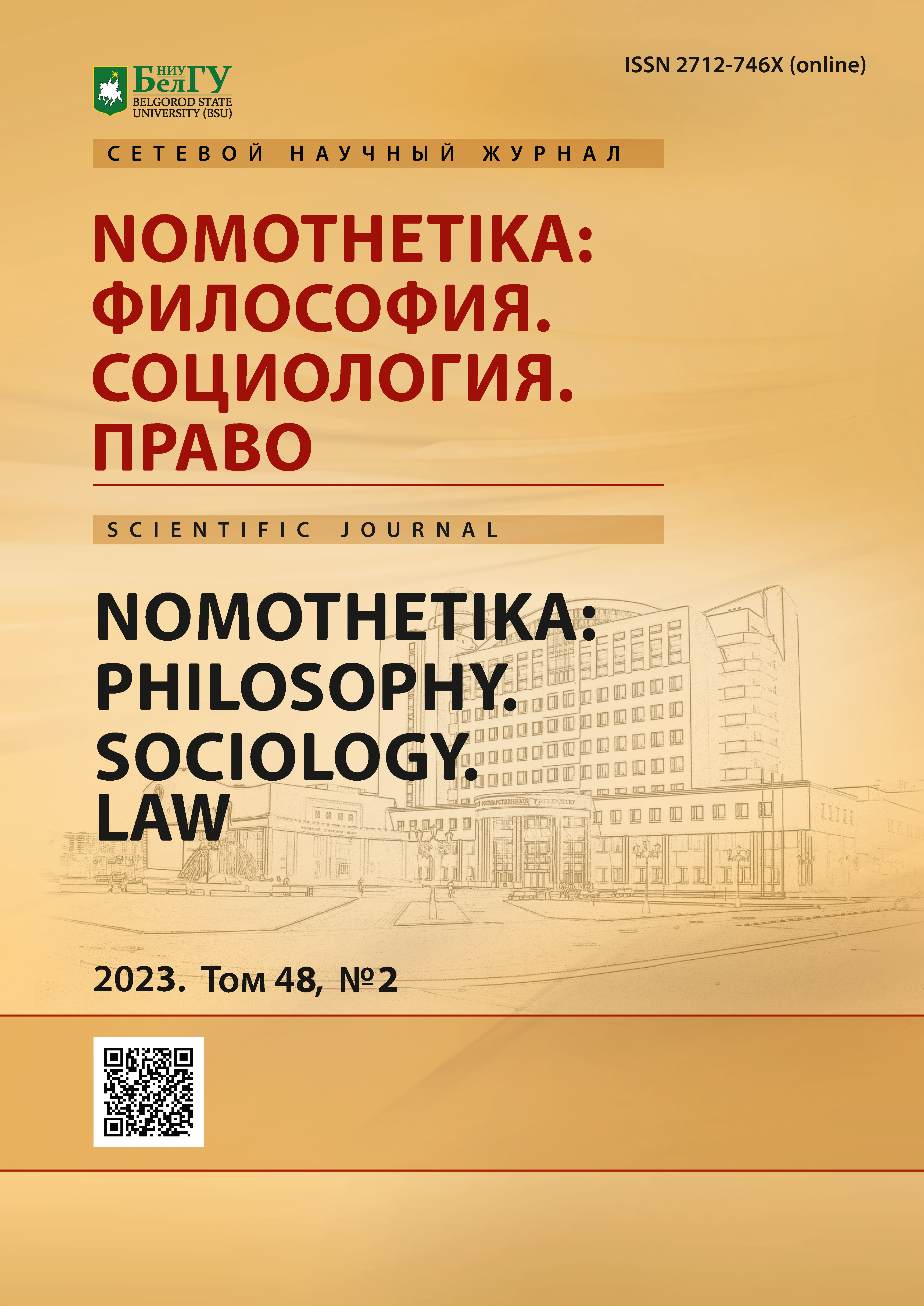The Relationship of Being and Thinking in the Philosophy of Parmenides and Plato
DOI:
https://doi.org/10.52575/2712-746X-2023-48-2-217-227Keywords:
being, thinking, сorrelationism, Plato, ParmenidesAbstract
The authors of the article turn to two fundamental concepts of Western European philosophy – being and thinking. These categories are again in the spotlight thanks to the philosophy of correlationism or speculative realism. Thinkers of the mentioned direction make an attempt to overcome the strong connection of being and thinking, focusing their criticism on the figure of I. Kant. However, the founders of the analyzed categories are ancient thinkers – Parmenides and Plato. The ancient Eleatic for the first time proclaims the principle of «being and thinking are the same», where the main role is played by a spherical being that allows a person to comprehend its truth. In turn, Plato introduces balance into this thesis, pointing out the similar structure of man and ontology with the help of the image of the line in the VI book of Republic. Meanwhile, the thinker justifies the existence of non-being as other in relation to being, which makes it possible to present a multitude of ideas at the heart of existence, and not a single sphere-like.
Downloads
References
Беркли Д. 1978. Сочинения. М., Мысль. 523 с.
Ахутин А.В. 2007. Античные начала философии. СПб., Наука, 784 с.
Богомолов А.В. 2019. Апофатическая проекция учений о материи в философии Платона, Аристотеля и Плотина. Манускрипт, 5: 91–94.
Делез Ж. 2011 Логика смысла. М., Академический Проект, 472 с.
Бриссон Л. 2019. Платон. М., Rosebud Publishing, 262 с.
Виндельбанд В. 1997. История философии. Киев, Ника-Центр, 553 с.
Гатри У.К.Ч. 2017. История греческой философии в 6 т. Т. II: Досократовская традиция от Парменида до Демокрита. СПб., Владимир Даль, 845 с
Грот Н.Я. 2007. Очерк философии Платона. М., КомКнига, 192 с.
Драч Г.В. 2003. Рождение античной философии и начало антропологической проблематики. М., Гардарики, 318 с.
Зелинский Φ.Ф. 2014. История античных религий. Том 1–3. СПб., Алетейя, 864 с.
Йегер В. 2021. Теология ранних греческих философов: Гиффордские лекции 1936 года. СПб., Владимир Даль, 350 с.
Лебедев А.В. Парменид из Элеи. 2008. Античная философия: Энциклопедический словарь Общ. ред. П.П. Гайденко, М.А. Солоповой и др. М.: Прогресс-Традиция, 896 с.
Месяц С.В. Учение Платона об идеях-числах. Космос и душа. Вып. 2. М.: Прогресс-Традиция, 2010. С. 28–82.
Тихонов А.В. 2022. Парменид исторический и Парменид платоновский: точки соприкосновения. Научная мысль Кавказа, 4(112): 50–55.
Тихонов А.В. 2003. Проблема микро- и макрокосмоса в философии Платона: автореф. дис. … канд. филос. наук: 09.00.03. Ростов-на-Дону, 20 с.
Троицкий М. М. 1887. Элементы логики. М., Книжный магазин В. Думнова, 152 с.
Федчук Д.А. 2019. Голос «Единого»: Альберт Великий, Фома Аквинский и Дунс Скот. СПб., РХГА, 304 с.
Харман Г. 2020. Спекулятивный реализм: введение. М., РИПОЛ классик, 290 с.
Целлер Э. 2012. Очерк истории греческой философии. М., Канон+, 352 с.
Шичалин Ю.А. Введение. Платон. Парменид. Пер. Ю.А. Шичалина. СПб., Издательство РГХА, 2017. 261 с.
Benson H.H. 2010. Plato’s philosophical method in the Republic: The Divided Line (510b–511d). Plato's Republic: A Critical Guide, Cambridge, 188–208.
Burnet J. 1920. Early greek philosophy. London, 394 p.
Cherniss H. F. 1932. Parmenides and the Parmenides of Plato. The American Journal of Philology, 53(2): 122–138.
Mackay R. (Ed.). 2007. Collapse, Volume 3: Unknown Deleuze Vol. 3. MIT Press. 464 p.
Coxon A. H. 2009. Fragments of Parmenides. Parmenides Publishing. 461p.
Dunham J., Grant I.H., Watson S. 2014. Idealism: The history of a philosophy. Routledge. 344 p.
Enwald M. 2004. Displacements of Deconstruction-The Deconstruction of Metaphysics of Presence, Meaning, Subject and Method. Tampere University Press. 251 p.
Hermann A. 2004. To think like god. Parmenides Publishing., 394 p.
Kahn C.H. 1969. The thesis of Parmenides. The Review of Metaphysics, 22(4): 700–724.
Lawlor L. Jacques Derrida. The Stanford Encyclopedia of Philosophy URL: https://plato.stanford.edu/archives/fall2022/entries/derrida/ (Дата обращения: 17.04.2023).
Mansfeld, J. 2005. Minima Parmenidea. Mnemosyne, 58(4): 554–560.
Rockmore T. 2021. After Parmenides: Idealism, Realism, and Epistemic Constructivism. University of Chicago Press, 208 p.
Wilkinson, L.A. 2009. Parmenides and to eon: reconsidering muthos and logos. Bloomsbury Publishing. 167 p.
Abstract views: 316
Share
Published
How to Cite
Issue
Section
Copyright (c) 2023 NOMOTHETIKA: Philosophy. Sociology. Law

This work is licensed under a Creative Commons Attribution 4.0 International License.


